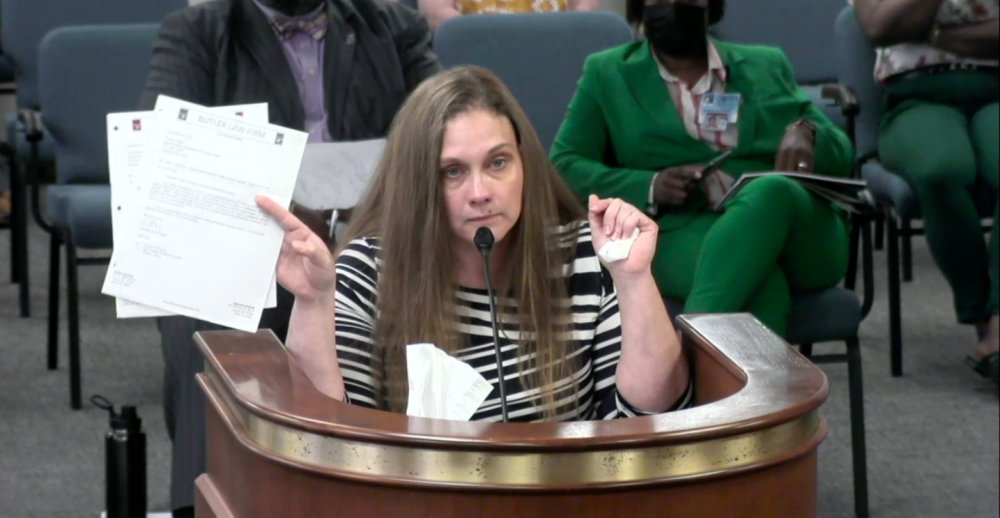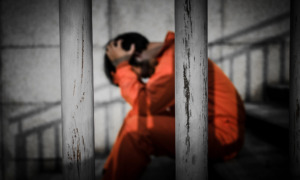
Screen capture courtesy of the South Carolina State Senate
Wendy Varner, mother of a 13-year-old juvenile detainee, testified about allegations of abuse in juvenile facilities during a June 9 South Carolina State Senate Corrections and Penology subcommittee on those allegations and correctional officer complaints of being overworked and underpaid.
Though technically it was against the rules, a juvenile corrections officer had been watching and chuckling along as a group of girl detainees enjoyed riding a foam mattress down a flight of stairs at a Union, S.C. detention facility in November 2020.
When a senior officer at Upstate Regional Evaluation Center appeared, however, the makeshift fun stopped, according to Wendy Varner, the mother of one of those girls, a 13-year-old.
Declaring the scene a riot, the supervising officer ordered his underlings to search the girls. In front of male officers the girls were forced to strip down to their bras and panties.
“Then, they slammed her up against a plexiglass window, and threw her against the ground,” Varner said, recounting what her daughter told her. “She got bruises from it, and she’s got the medical records to prove it.”
For the next 16 hours after that, Varner said, her daughter was placed in solitary confinement, dressed only in her underwear, with no food, no bedding or anything else to fend off a November chill permeating the facility, she said. Varner would not disclose why her daughter had been arrested or whether she’d been convicted of anything; in South Carolina juvenile arrests and convictions are confidential court records.
CRITICS: REFORM SOUTH CAROLINA JUVIE SYSTEM
Varner’s daughter’s experience highlights what critics argue are needed reforms of a state agency whose deficiencies prompted corrections officers and teachers at a different South Carolina Department of Juvenile Justice facility, 70 miles away from where that 13-year-old was detained, to walk off the job in early June. On June 9, a South Carolina State Senate Corrections and Penology subcommittee conducted a hearing on allegations that some youths were being abused by facility staff; and complaints by correctional officers that they were being overworked and underpaid for a job that also finds them, at times, assaulted by youths under the agency’s supervision.
Officials of the state’s juvenile justice department did not respond to a request for comment about what Varner alleges happened to her daughter, or to answer when promised additional staffers will be hired in their detention facilities.
OFFICER: CORRECTIONS STAFF IS OVERWORKED
 When Lt. Ricky Dyckes Jr., an almost 11-year veteran of the agency’s correctional officer workforce, got to work on June 4, signs of how fed up his colleagues were clear.
When Lt. Ricky Dyckes Jr., an almost 11-year veteran of the agency’s correctional officer workforce, got to work on June 4, signs of how fed up his colleagues were clear.
“People had no idea when they were getting off; they’d work 20, 24 hours straight sometimes,” Dyckes said. “We had staff that were so tired when they finished working they couldn’t drive home. They had to sleep in their car.”
Both the current and previous directors of the juvenile justice department have testified before state legislative hearings about the shortages among correctional staff and the impact of shortages on agency operations.
Dyckes also alleged that juveniles do physically attack corrections officers, and that that prompts some officers to leave the job.
Dyckes said because of the lack of staff, officers were regularly expected to log overtime and were not always paid, which led to the walkout at the Broad River Road facility on June 4.
Via email, Jarid Munsch, spokesman for juvenile justice department wrote: “In accordance with state regulations and approved by the Office of State Human Resources, [department] policy states that for employees involved in security activities on a 28-day, 160-hour cycle, overtime is hours worked in excess of 171 hours in a 28-day cycle. The Department of Juvenile Justice will compensate the employee either by payment at the rate of 1½ times his/her regular rate of pay for all hours worked over 171 hours, or by compensatory time given at the rate of 1½ hours for every hour worked in excess of 171 hours. The hours worked between 160 and 171 will be at a straight time rate.”
“It wasn’t,” corrections officer Dyckes said, of the walkout, “something that anyone had planned necessarily, we just kind of did it. Once we did that, I think the director finally heard us. But they had plenty of time before that. We’ve been sending emails since 2018 and 2019.”
Among other shortcomings, the department sometimes does not have enough officers to meet a required ratio of one corrections officer for every eight juveniles in detention. And that has a ripple effect, said educator Belinda McEachern, who taught IT classes for youth at the department for almost 22 years. She was laid off from that job in 2019.
“If they could not meet the ratio of staff-to-youth, they wouldn’t let them go to classes,” McEachern said. “That meant that they wouldn’t be getting the instruction they needed. They’d just be sitting idle.”
Another staff member, an education coordinator at one of the department’s three evaluation centers (where juveniles are assessed psychologically, socially and educationally as part of the adjudication of their cases) agreed with McEachern that youth are further set back when that ratio isn’t met.
“It has an impact on the behavior of the entire unit. They’re getting the schoolwork, but they’re not being shown how to do it. If they’re not at school, we can’t just go into the unit and educate them,” said the staff member, who declined to be named to protect her employment. “I would assume their minds are just idle at this point … If they don’t meet that one-to-eight ratio, they have to stay put in their dorms.”
SENATOR CRITICIZED SOLITARY FOR JUVENILES
At the June 9 hearing of the state senate subcommittee, South Carolina Department of Juvenile Justice Director Freddie Pough largely blamed correctional staff shortages on the state’s comparatively low pay for officers, whose starting salary roughly is $37,000 annually, and on a lack of state funding for bonus pay.
Also during that hearing, after a tense exchange over the length of time youth are required to spend in solitary isolation, Sen. Michael Johnson (R-York County) suggested that Pough should no longer direct the agency.
“I’ve lost all confidence,” Johnson said during his questioning of Pough. “I know you’re committed, and commitment is great, but these facts don’t lie. You are putting children in isolation for an average of 70 hours a month.”
Based on the department’s data, youth who were placed in solitary confinement were held there, on average, for three days of each month this year, so far.
At the end of the hearing, the subcommittee unanimously approved a vote-of-no-confidence in Pough.
MERITS OF SOLITARY CONFINEMENT ARE DEBATED
Lt. Dyckes said the isolation of youth as one of the only ways to properly control the most violent offenders.
“Some of these kids are assaulting staff, getting out immediately [from solitary] and they’ll go and do it again,” Dyckes said. “It is worth it in my view. We need to make sure they are not on the yard with other kids who are trying to do the right thing.”
James, the former security coordinator, however, said he has seen improperly trained officers rely on isolation as a primary form of punishment.
“When I first started in the department, around 2002, there were a lot of officers who saw isolation as something normal for youth who were especially aggressive,” James said. “But as time went on, the nation has shifted its views on solitary, and youth incarceration. Those officers still think it’s the best way to keep them safe.”
PARENTS EXPRESS HOPES FOR CHANGE
Since the walkout and the vote-of-no-confidence in Pough, the department’s director, parents and staff said they are hopeful that the conditions within the department can improve.
One parent, whose child is currently held at one of the state’s juvenile facilities, said she’s been allowed more contact with her son since the walkout. But more changes must be made, added that mother, who asked not to be named, fearing the department might retaliate against her son.
“I’ve had more contact with him over the phone than I’ve ever had before,” the mother said. “We still can’t go visit them in person because of COVID restrictions, though. I would love to hear why they still won’t let us in.”
That parent also is frustrated that her contacts with her son aren’t fully private: “I haven’t had any opportunity to speak with him without being on speaker phone in front of a social worker. You can hear them in the background and I just feel like I can’t really ask him what’s actually going on in there.”
SOME STAFFERS SAID THEIR WORK IS MEANINGFUL AND FULFILLING
Of a half dozen current and former department staffers interviewed for this article, each said they love their work. When run correctly, the agency can have an impact and help steer wayward young people in a better direction.
“I truly think it’s a place that can really make a difference,” the unnamed education coordinator said. I’ve seen young people whose lives have changed, but I believe more time needs to be invested in helping youth, and practicing what you preach, and working at the speed of trust. “Being ethical and saying what you’re going to do, that holds more weight than throwing money at a situation.”
Still, some remained concerned about whether Pough can effectively manage the department. Some parents, especially, said he has been unresponsive, including after his appearance before the senate subcommittee.
During her testimony there, Varner cried as she read snippets of letters detained youth wrote to the director, asking him to improve the quality of life in their facility.
As she handed the letters to Pough directly, she can be seen off microphone having a brief exchange with him. Later, via telephone with this reporter, she said the director seemed confused about why she was handing him a stack of papers.
He asked her, Varner said, “Oh, these are for me?” Immediately after saying that, Varner said, he put the letters on the floor of that hearing room and returned his attention to his cellphone.
For more information on juvenile justice issues and reform trends, go to our sister site
Juvenile Justice Information Exchange
► JJIE Resource Hub































